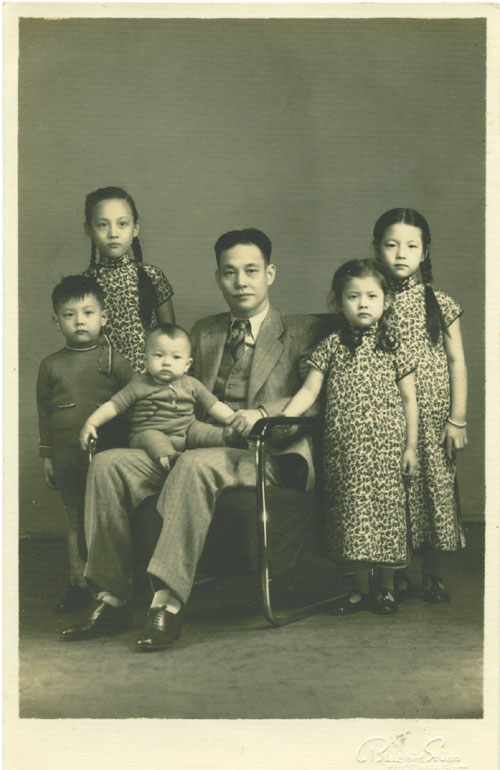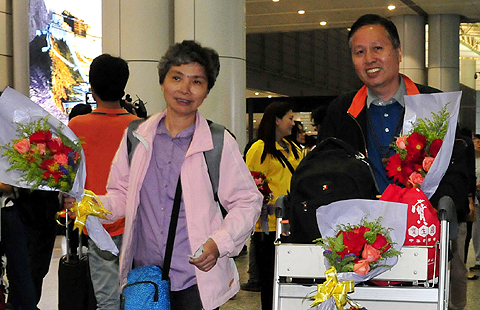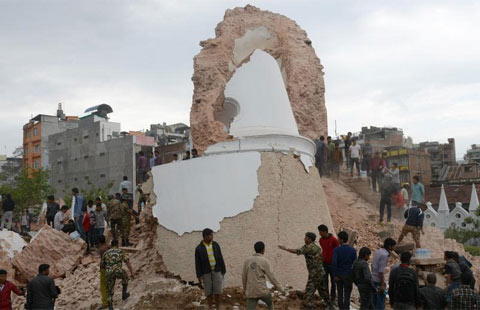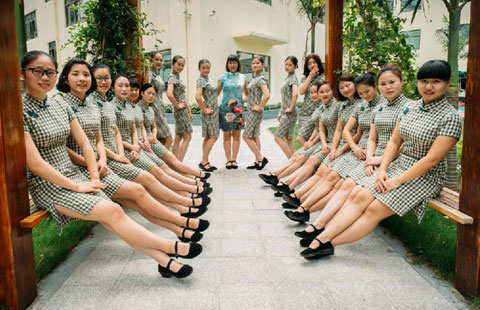Michael Chow: A Life fit for a Hollywood script
Updated: 2015-03-06 11:41
By Li Jing(China Daily USA)
|
||||||||
 |
|
MichaelChow (the youngest) and his siblings with father Zhou Xinfang. Provided to China Daily |
Around the founding of the People's Republic of China, Chow's mother sent Chow and his siblings abroad, in advance of a cascade of social movements that would lay waste to his family's fortune and legacy.
Chow said his mother had many talents dealing with life and skills to live in the world. "My career life is based half on my father and half on my mother," Chow added.
In 1951, Chow went on his own to boarding school in England in the bleak, war-ravaged and food-rationed country, leaving a life of pampered opulence.
Different from the new rich second generation 60 years later, Chow's overseas life started with a rude shock.
"I lost everything I loved or familiar. I found myself an alien in an unfamiliar place. I felt like Oliver Twist," Chow recalled with a sense of sadness. "I never saw my father again." He saw his mother only once more when she visited him earlier at school.
"Chinese was seen as the lowest of the low. I had a bad health and I felt I was on the edge of death every day," Chow recalled. "But if I could survive, I could rejuvenate to do everything. I needed to fight the battle."
An interest in photography led to a year at Saint Martin's School of Art, and from 1956 to 1958 he studied architecture at the Hammersmith School of Art and Building.
He painted for 10 years and showed in a range of exhibitions in the London art scene of the 1960s, with titles like "Three Contemporary Chinese Artists" and "Artists of Fame and Promise".
"But the conditions weren't quite right, there was no support system for me to be an artist, certainly not in London and America and history proves that. I think the only successful artist was Zao Wou-Ki and he lived in Paris," Chow said in an interview with ARTINFO Hong Kong.
"Previously, it was very cynical. There were only two jobs for Chinese, laundry or restaurant."
Having flair of networking and a knack for being in the right place at the right time, he went on to open the iconic Mr. Chow restaurants, first in London, then New York and Los Angeles, where he lives today.
The restaurants are as famous for the people who dine in them as they are for their Beijing duck -- The Beatles and The Rolling Stones have all hung out at Mr. Chow's and John Lennon ate his last meal out at Mr. Chow New York.
From an early age he became an obsessive collector of furniture and contemporary art, notably his, famous collection of portraits (of himself) by world-renowned artists.
In the long gallery of the exhibition space, Chow's paintings are joined by his iconic portrait collection, which includes works by artists such as Andy Warhol and Jean-Michel Basquiat. Many of these portraits were acquired directly from these artists or given as gifts in recognition of friendship and collaboration with Chow over the years.
"My works are collages and basically my life is a collage, too," Chow said. "Collage allows putting different things together, so I want to encompass as wide as I can. In order to survive in the West alone, I have to have life skills by using techniques of collage."
In Chow's works, gold leaf and silver, household trash, acrylic paint, blow-torched metal and broken eggs are mixed on the canvases.
"In some ways, my father has been very lucky," says his eldest daughter, China Chow, as quoted by W Magazine. "He is incredibly hardworking, has a great eye, and has mastered the art of running a restaurant down to the tiniest detail. But he also has a knack for popping up in the right places at the right time -- London in the 1960s and 1970s, when that city was the cultural center of the world; New York and L.A. during the art and showbiz booms there. It's uncanny."
Finally though, the timing was right to return to China.
"Fifty years ago, for a Chinese painter in the West, there was no support system and I had no encouragement. But now, I feel that the conditions are correct, especially with China being so prosperous and creating many great recent artists," Chow said.
"China went through almost 500 years of decline, and in particular in the 20th Century, suffering from two World Wars, civil war and natural disasters. The good thing is that the reversal, from my point of view, started in 1949, boosted by 2008 Beijing Olympics. China reverses itself and 21st century belongs to China.
"Like liangxiang (striking a pose when staging on the stage) in Peking opera or the opening scenes from movies, I hope my paintings to grasp the audience at the first sight," said Chow. "Simplistic and powerful, like a hook."
Amicable and jovial, he imitates a Peking Opera performer's action on stage to explain the point. Behind his trademark, black-rimmed bespoke glasses, the energetic septuagenarian doesn't resemble a person of his age and the glasses give him an almost startled look.
"I had bad fortune and good fortune mixed all in one. I left for London at 13 and lost everything I was familiar with, but got my objective mindset to view the world," Chow said.
Lijing2009@chinadaily.com.cn

 International rescue teams head to quake-hit Nepal
International rescue teams head to quake-hit Nepal
 World's deadliest earthquakes since 1900s
World's deadliest earthquakes since 1900s
 Rescuers deliver relief supplies on foot
Rescuers deliver relief supplies on foot
 China brings trapped nationals home from quake-hit Nepal
China brings trapped nationals home from quake-hit Nepal
 Severe drought hits Southwest China
Severe drought hits Southwest China
 History razed in Nepal earthquake
History razed in Nepal earthquake
 'Chi-pao teachers' found in Guangdong
'Chi-pao teachers' found in Guangdong
 Tourists evacuated from Nepal quake area arrive in Kunming
Tourists evacuated from Nepal quake area arrive in Kunming
Most Viewed
Editor's Picks

|

|

|

|

|

|
Today's Top News
Chinese, Koreans seek Japan apology
China rescue team starts work
Three US citizens among dead in avalanche after Nepal quake
Chinese rally across US to support NYC police officer under indictment
New publication will focus on China's energy industry
Abe's US trip: sense or sensibility?
China to overtake US in mobile gaming market
Nearly 2,500 confirmed dead in Nepal quake
US Weekly

|

|






